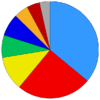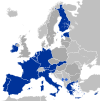- List of European Council meetings
-
This is a list of European Councils; the meetings of the European Council, an institution of the European Union (EU) comprising heads of state or government of EU member states. They started in 1975 as tri-annual meetings, but now take place at least four times a year and, in recent years, usually six times, either for a single day or for two days (see list below).
Contents
List
1975–2009
# Year Date Type EU Council presidency President-in-Office Host city 1 1975 10–11 March ―  Ireland
IrelandLiam Cosgrave Dublin Notes2 16–17 July ―  Italy
ItalyAldo Moro Brussels Notes3 1–2 December ― Rome Notes4 1976 1–2 April ―  Luxembourg
LuxembourgGaston Thorn Luxembourg Notes5 12–13 July ―  Netherlands
NetherlandsJoop den Uyl Brussels Notes6 29–30 November ― The Hague Notes7 1977 25–27 March ―  UK
UKJames Callaghan Rome Notes8 29–30 June ― London Notes9 5–6 December ―  Belgium
BelgiumLeo Tindemans Brussels Notes10 1978 7–8 April ―  Denmark
DenmarkAnker Jørgensen Copenhagen Notes11 6–7 July ―  Germany
GermanyHelmut Schmidt Bremen Notes12 4–5 December ― Brussels Notes13 1979 12–13 March ―  France
FranceValéry Giscard d'Estaing Paris Notes14 21–22 June ― Strasbourg Notes15 29–30 November ―  Ireland
IrelandJack Lynch Dublin Notes16 1980 17–18 April ―  Italy
ItalyFrancesco Cossiga Luxembourg Notes17 12–13 June ― Venice Notes18 1–2 December ―  Luxembourg
LuxembourgPierre Werner Luxembourg Notes19 1981 23–24 March ―  Netherlands
NetherlandsDries van Agt Maastricht Notes20 29–30 June ― Luxembourg Notes21 26–27 November ―  UK
UKMargaret Thatcher London Notes22 1982 29–30 March ―  Belgium
BelgiumWilfried Martens Brussels Notes23 28–29 June ― Brussels Notes24 3–4 December ―  Denmark
DenmarkPoul Schlüter Copenhagen Notes25 1983 21–22 March ―  Germany
GermanyHelmut Kohl Brussels Notes26 17–19 June ― Stuttgart Notes27 4–6 December ―  Greece
GreeceAndreas Papandreou Athens Notes28 1984 19–20 March ―  France
FranceFrançois Mitterrand Brussels Notes29 25–26 June ― Fontainebleau Notes30 3–4 December ―  Ireland
IrelandGarret FitzGerald Dublin Notes31 1985 29–30 March ―  Italy
ItalyBettino Craxi Brussels Notes32 28–29 June ― Milan Notes33 2–3 December ―  Luxembourg
LuxembourgJacques Santer Luxembourg Notes34 1986 26–27 June ―  Netherlands
NetherlandsRuud Lubbers The Hague Notes35 5–6 December ―  UK
UKMargaret Thatcher London Notes36 1987 29–30 June ―  Belgium
BelgiumWilfried Martens Brussels Notes37 4–5 December ―  Denmark
DenmarkPoul Schlüter Copenhagen Notes38 1988 11–13 February ―  Germany
GermanyHelmut Kohl Brussels Notes39 27–28 June ― Hanover Notes40 2–3 December ―  Greece
GreeceAndreas Papandreou Rhodes Notes41 1989 26–27 June ―  Spain
SpainFelipe González Madrid Notes42 18 November Informal  France
FranceFrançois Mitterrand Paris Notes43 8–9 December ― Strasbourg Notes44 1990 28 April Extraordinary  Ireland
IrelandCharles Haughey Dublin Notes45 25–26 June ― Dublin Notes46 27–28 October ―  Italy
ItalyGiulio Andreotti Rome Notes47 14–15 December ― Rome Notes48 1991 8 April Informal  Luxembourg
LuxembourgJacques Santer Luxembourg Notes49 28–29 June ― Luxembourg Notes50 9–10 December ―  Netherlands
NetherlandsRuud Lubbers Maastricht Notes51 1992 27 June ―  Portugal
PortugalAníbal Cavaco Silva Lisbon Notes52 16 October ―  UK
UKJohn Major Birmingham Notes53 11–12 December ― Edinburgh Notes54 1993 21–22 June ―  Denmark
DenmarkPoul Nyrup Rasmussen Copenhagen Notes55 29 October ―  Belgium
BelgiumJean-Luc Dehaene Brussels Notes56 10–11 December ― Brussels Notes57 1994 24–25 June ―  Greece
GreeceAndreas Papandreou Corfu Notes58 15 July ―  Germany
GermanyHelmut Kohl Brussels Notes59 9–10 December ― Essen Notes60 1995 26–27 June ―  France
FranceJacques Chirac Cannes Notes61 22–23 October Extraordinary  Spain
SpainFelipe González Majorca Notes62 15–16 December ― Madrid Notes63 1996 29–30 March ―  Italy
ItalyLamberto Dini Turin Notes64 21–22 June ― Romano Prodi Florence Notes65 5 October Extraordinary  Ireland
IrelandJohn Bruton Dublin Notes66 13–14 December ― Dublin Notes67 1997 23 May Informal  Netherlands
NetherlandsWim Kok Noordwijk Notes68 16–17 June ― Amsterdam Notes69 20–21 November Extraordinary  Luxembourg
LuxembourgJean-Claude Juncker Luxembourg Notes70 12–13 December ― Luxembourg Notes71 1998 3 May ―  UK
UKTony Blair Brussels Notes72 15–16 June ― Cardiff Notes73 24–25 October Informal  Austria
AustriaViktor Klima Pörtschach Notes74 11–12 December ― Vienna Notes75 1999 26 February March Informal  Germany
GermanyGerhard Schröder Königswinter Notes76 25–26 March ― Berlin Notes77 14 April Informal Brussels Notes78 3–4 June ― Cologne Notes79 15–16 October ―  Finland
FinlandPaavo Lipponen Tampere Notes80 10–11 December ― Helsinki Notes81 2000 23–24 March ―  Portugal
PortugalAntónio Guterres Lisbon Notes82 19–20 June ― Santa Maria da Feira Notes83 13–14 October Informal  France
FranceJacques Chirac Biarritz Notes84 7–9 December ― Nice Notes85 2001 23–24 March ―  Sweden
SwedenGöran Persson Stockholm Notes86 15–16 June ― Gothenburg Notes87 21 September Informal  Belgium
BelgiumGuy Verhofstadt Brussels Notes88 19 October Informal Ghent Notes89 14–15 December ― Laken Notes90 2002 15–16 March ―  Spain
SpainJosé María Aznar López Barcelona Notes91 21–22 June ― Seville Notes92 24–25 October ―  Denmark
DenmarkAnders Fogh Rasmussen Brussels Notes93 12–13 December ― Copenhagen Notes94 2003 17 February Extraordinary  Greece
GreeceCostas Simitis Brussels Notes95 20–21 March ― Brussels Notes96 16–17 April Informal Athens Notes97 20 June ― Thessaloniki Notes98 4 October Extraordinary  Italy
ItalySilvio Berlusconi Rome Notes99 16–17 October ― Brussels Notes100 12–13 December ― Brussels Notes101 2004 25–26 March ―  Ireland
IrelandBertie Ahern Brussels Notes102 17–18 June ― Brussels Notes103 4–5 November ―  Netherlands
NetherlandsJan Peter Balkenende Brussels Notes104 16–17 December ― Brussels Notes105 2005 22–23 March ―  Luxembourg
LuxembourgJean-Claude Juncker Brussels Notes106 16–17 June ― Brussels Notes107 27 October Informal  UK
UKTony Blair Hampton Court Notes108 15–16 December ― Brussels Notes109 2006 23–24 March ―  Austria
AustriaWolfgang Schüssel Brussels Notes110 15–16 June ― Brussels Notes111 20 October Informal  Finland
FinlandMatti Vanhanen Lahti Notes112 14–15 December ― Brussels Notes113 2007 8–9 March ―  Germany
GermanyAngela Merkel Brussels Notes114 21–22 June ― Brussels Notes115 18–19 October Informal  Portugal
PortugalJosé Sócrates Lisbon Notes116 14 December ― Brussels Notes117 2008 13–14 March ―  Slovenia
SloveniaJanez Janša Brussels Notes118 19–20 June ― Brussels Notes119 13–14 July ―  France
FranceNicholas Sarkozy Brussels Notes120 1 September Extraordinary Brussels Notes– 13 October Eurozone Paris Notes121 22–23 October ― Brussels Notes122 7 November Extraordinary Brussels Notes123 2009 1 March Extraordinary  Czech Republic
Czech RepublicMirek Topolánek Brussels Notes124 19–20 March ― Brussels Notes125 5 April ― Jan Fischer Prague Notes126 18–19 June ― Brussels Notes127 17 September Extraordinary  Sweden
SwedenFredrik Reinfeldt Brussels Notes128 29–30 October ― Brussels Notes129 19 November Extraordinary Brussels Notes130 10–11 December — Brussels Notes2010–present
# Year Date Type President Location Conclusion 131 2010 11 February Informal Herman Van Rompuy Solvay Library, Brussels 132 25–26 March ― Justus Lipsius building, Brussels [63] – 7 May Eurozone Justus Lipsius building, Brussels 133 17 June ― Justus Lipsius building, Brussels [64] 134 16 September ― Justus Lipsius building, Brussels [65] 135 28–29 October ― Justus Lipsius building, Brussels [66] 136 16–17 December ― Justus Lipsius building, Brussels [67] Details
European Union 
This article is part of the series:
Politics and government of
the European UnionPolicies and issuesCologne 1999
The European Council met in Cologne on 3–4 June 1999 to consider issues after the Treaty of Amsterdam came into force. Romano Prodi presented his plan for the future Commission's work and reform program. The Council called for an EU Charter of Fundamental Rights.
The Council designated Javier Solana for the post of Secretary-General of the Council of the European Union (with Pierre de Boissieu as his deputy) and High Representative for the Common Foreign and Security Policy (CFSP). It decided on a common policy on Russia (first use of the CFSP). Adopted the declaration on Kosovo. In relation to the European Security and Defence Policy, a major element of the CFSP, the council declared that the EU "must have the capacity for autonomous action, backed up by credible military forces, the means to decide to use them, and a readiness to do so, in order to respond to international crises without prejudice to actions by NATO." (Declared in St Malo by France and Great Britain)
Laken 2001
The Laken European Council was held at the royal palace at Laken, Belgium on 14–15 December 2001.
The main matters the Laken European Council dealt with were: new measures in the area of Justice and Home Affairs: the European arrest warrant, a common definition of terrorism, and EUROJUST; the seats of 10 new EU agencies—after hours of disagreement, the European Council failed to reach an agreement and decided to leave the decision until next year; the impending introduction of Euro cash (the European Council met with the Finance ministers to consider this); the progress of EU enlargement; the adoption of the Laken Declaration on the Future of Europe, establishing the European Convention, to be presided over with former President of France, Valéry Giscard d'Estaing, as President of the Convention, and former Italian Prime Minister Giuliano Amato and former Belgian Prime Minister Jean-Luc Dehaene as Vice-Presidents. The Convention was tasked with drafting the Treaty establishing a Constitution for Europe, and would have about 60 members, drawn from national governments, national Parliamentarians, the European Parliament, and the European Commission, and include representatives from the candidate countries. The declaration reviews the progress of European integration over the last fifty years, tracing it back to its origins in the horrors of World War II, and poses a number of questions to be answered by the Convention.[3][4]
See also
References
External links
European Council  Van Rompuy (President) ·
Van Rompuy (President) ·
 Faymann ·
Faymann ·  Leterme ·
Leterme ·  Borisov ·
Borisov ·  Christofias ·
Christofias ·  Nečas ·
Nečas ·  Thorning-Schmidt ·
Thorning-Schmidt ·  Ansip ·
Ansip ·  Katainen ·
Katainen ·  Sarkozy ·
Sarkozy ·
 Merkel ·
Merkel ·  Papademos ·
Papademos ·  Orbán ·
Orbán ·  Kenny ·
Kenny ·  Monti ·
Monti ·  Dombrovskis ·
Dombrovskis ·  Grybauskaitė ·
Grybauskaitė ·  Juncker ·
Juncker ·  Gonzi ·
Gonzi ·
 Rutte ·
Rutte ·  Tusk ·
Tusk ·  Passos Coelho ·
Passos Coelho ·  Boc ·
Boc ·  Radičová ·
Radičová ·  Pahor ·
Pahor ·  Zapatero ·
Zapatero ·  Reinfeldt ·
Reinfeldt ·  Cameron ·
Cameron ·
 Barroso
Barroso Categories:
Categories:- European Council
- 20th-century diplomatic conferences
- 21st-century diplomatic conferences
Wikimedia Foundation. 2010.






